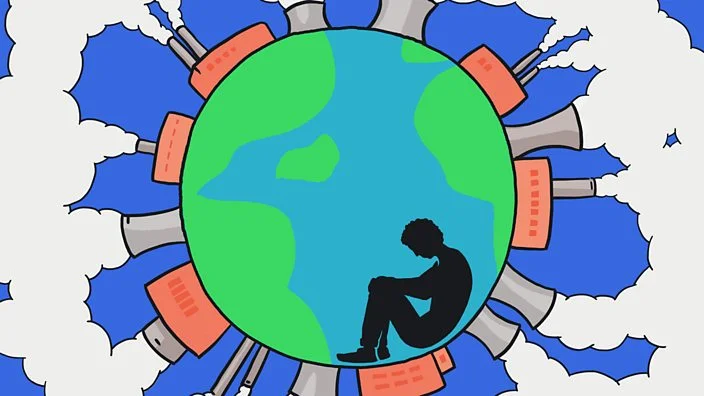Climate Change Is Keeping Therapists Up at Night
climate change is keeping therapists up at night – Weather change has become a primary global concern in recent years, dominating headlines and discussions. Climate change awareness has not only ignited activism and environmental initiatives. It has also had a profound impact on various aspects of society. Mental health treatment is one such sector facing unexpected challenges due to climate change. This article explores the repercussions of weather trade on therapists, their patients, and the therapeutic method.

Overview Climate Change Is Keeping Therapists Up at Night
Climate change is not just about melting glaciers and rising sea levels. Its effects are far-reaching and extend into areas of our lives that we may not immediately associate with environmental issues. Mental health is one such domain significantly affected by climate change. Here’s how:
Read More – The Essential Skills For Being Human – Change Your Life
Read More – Maui Is Open For Tourism Or Not

1. Eco-Anxiety: The New Mental Health Challenge
Eco-tension, also known as climate tension, is a relatively new area of psychology. It refers to the anxiety and distress individuals experience because of existential threats posed by weather alternates. Demand for a secure future is rising as our planet faces more severe weather events, natural disasters, and ecological crises, particularly concerning the younger generation. Therapists are seeing an increase in eco-anxiety. People seek help for weather-related worries.
Read More – Underrated Travel Summer Ideas 2023 – Chicago
Read More – Water Parks In Chicago – Ultimate Level Of Fun
2. Grief and Climate-Related Loss
Many people have lost loved ones, homes, and possessions to extreme weather events like hurricanes, wildfires, and flooding. This loss can cause profound grief and trauma. Therapists are grief counselors, helping people to navigate the complex feelings associated with weather-related losses.
3. Climate-induced conflicts in relationships.
climate change is keeping therapists up at night change can lead to conflicts within families and relationships. Disagreements about environmental values, sustainable practices, and future concerns can strain even the closest bonds. Many couples and families are getting therapy to deal with the tensions and conflicts caused by climate change, which makes the therapist’s job more complex.
Therapists as Climate Counsellors
As climate change impacts mental health, therapists adapt their practices to serve their clients better. They provide both traditional therapy and climate-informed counseling to help individuals deal with distress caused by climate-related issues.

1. Recognizing Eco-anxiety
Therapists identify eco-anxiety signs. This involves listening to clients who express concerns about climate change, its effects, and their emotional responses. By recognizing eco-anxiety, therapists can offer targeted interventions and support.
2. Coping Strategies for Climate-related Stress
Therapists equip customers with coping strategies for weather change, pressure, and tension. These strategies include mindfulness, pressure control, and self-care practices to deal with climate-related worries.
3. Family and Couples Counselling
Therapists provide their intend about climate change to all family members and couples dealing with climate-related conflicts and therapists are critical to helping people with relationship problems due to climate change.

Why Climate Change Is Keeping Therapists Up At Night ?
Therapists are not helping indvidual for climate awarnees but they help all of us for undertanding the climate situtation for mental health.
1. Public awareness campaigns
Many therapists are involved in public awareness campaigns to destigmatize mental health issues arising from climate change. Speaking up and sharing their knowledge helps break the social stigma around mental health and environmental problems.
2. Lobbying for Policy Change
Therapists are joining forces with environmental organizations to advocate for policies that address climate change at a systemic level. They recognize that mitigating climate change is fundamental to preventing mental health crises.
Addressing the Mental Health Crisis:
Collective Responsibility and Joint Effort. Here are some critical steps to address this growing crisis:

1. Education and awareness.
Education is a powerful tool in elevating attention to weather exchange’s intellectual fitness implications. Schools and universities should include climate psychology in their curriculum to help young people understand and manage eco-anxiety. Public attentPromote campaigns to destigmatize seeking remedies for climate-related distress.
2. Support therapists climate change is keeping therapists up at night
Professional organizations and mental health institutions can train therapists to identify and manage eco-anxiety, grief, and climate-induced conflicts. Financial support can be offered to make mental health services more accessible.
3. Government initiatives.
Governments play a crucial role in reducing climate change impacts and its effects on mental health. Implementing policies to reduce greenhouse gas emissions, funding research on the psychological impacts of climate change, and providing resources for disaster relief and recovery can help therapists and their clients significantly.
4. Community support
Communities can come together to create a supportive environment for those suffering from climate-related mental health troubles. Supporting businesses and community groups can offer a safe environment for individuals to share their worries and analyze coping strategies. Building resilience in the community is essential for intellectual fitness.
5. Climate action
The most effective way to address the mental health crisis caused by climate change is by taking effective action to combat global warming. Therapists are not alone in advocating climate action. We should all work together to reduce carbon emissions, switch to renewable energy sources, and protect vulnerable communities from climate-related disasters.

The Road Ahead
The intersection of weather and intellectual health presents a challenging task. However, it also allows society to unite, support each other, and make meaningful progress towards a sustainable future. Therapists are leading the way in addressing climate change’s mental health effects but cannot do it alone. We all have a role in creating a world where people do not worry about the environment at night. Instead, they feel reassured that their concerns are understood and cared for.
In this ever-evolving world, weather exchange is now not just limited to environmental science. It has become a complex and interconnected problem affecting our collective mental well-being. We can ease therapists’ concerns about climate change’s impact on their clients by recognizing the problem, learning about it, and taking appropriate measures. Together, we can build a more sustainable and fit international for all.
The Importance of Self-Care Faced with Climate Anxiety
A crucial, overlooked aspect of discussions about climate justice and mental health is self-care. It’s imperative to recognize that people dealing with eco-tension and climate-induced stress can safeguard their intellectual well-being. Here are some powerful self-care strategies.
1. Stay Informed, But Don’t Obsess.
It’s essential to stay informed about climate change and its implications, but excessive exposure to distressing news can exacerbate anxiety. Set designated times to catch up on climate news and balance it with other activities and interests.
2. Seek support.
Talking to friends and family about climate-related concerns can be comforting. They can provide emotional support and even join you in advocating for climate action. Don’t hesitate to lean on your social network during anxiety times.
3. Engage in relaxation techniques.
Mindfulness meditation, yoga, and deep breathing exercises are powerful tools to reduce tension. In the face of complex environmental information, you can stay grounded and maintain emotional stability.
4. Focus on action.
Feeling a sense of agency in addressing climate change can significantly alleviate eco-anxiety. Get involved in local environmental initiatives, reduce your carbon footprint, and support climate action policies and organizations.
5. Professional help
If your climate-related distress becomes overwhelming, seek an intellectual fitness expert. Therapists help you navigate your emotions and increase coping strategies.
Pressing Ahead with Hope and Purpose
Climate change poses significant challenges to our mental health, but it’s imperative to remember that we’re not alone in this fight. A global team of therapists, advocates, scientists, and individuals work together to address climate change’s environmental and mental impacts.
Understanding the connection between weather and intellectual fitness allows us to make informed decisions, support each other, and take action for a healthier and more sustainable future. It’s not just about ranking higher on Google; it’s about making a difference in the lives of many people struggling with the emotional impact of a changing world.
The weather affects therapists and communities in the sector but also brings purpose and unity. By recognizing and addressing mental health issues, we can work towards a future where our well-being and the planet are protected.
How Climate Change Impacts Therapy
Climate Change effects on therapy. There are countless ways to address climate change, both directly and indirectly. As people become more aware of its impact, they adopt various strategies to combat it. Evolution and its long-term effects have caused a new anxiety called eco-tension or weather tension. Growing numbers of individuals are distressed by climate change’s existential threats. Therapists encounter customers grappling with environmental issues.
Is Climate Change Causing Depression?
Constant exposure to distressing news about climate change, witnessing natural disasters, and feeling powerless against environmental challenges can cause eco-anxiety and, sometimes, depression. Therapists are seeing an increase in cases of individuals seeking help for symptoms related to climate-induced distress.
How to climate change is keeping therapists up at night?
Addressing panic and anxiety about climate change requires a multi- faceted approach:
Stay Informed, But in Moderation: It’s essential to know environmental issues, but don’t obsessively consume distressing climate-related news.
Seek Social Support: Talking to friends and family about your concerns can provide emotional relief. You can share your worries and work together to advocate for climate action.
Practice Self-Care: Engage in relaxation techniques like meditation and deep breathing to manage anxiety. Focusing on your physical and mental well-being is crucial.
Empower Yourself: Feeling agency in addressing climate change can alleviate anxiety. Get involved in environmental initiatives and support policies aimed at mitigating climate change.
Professional Help: If climate-related distress overwhelms you, consider seeking mental health assistance. Therapists help individuals navigate their emotions and develop effective coping strategies.
Why climate change is keeping therapists up at night?
Climate anxiety, or eco-anxiety, has become an increasingly prevalent concern over time. People are becoming more worried about the future due to increasing media reports on environmental crises caused by climate change and the anxiety is not confined to any specific age group however it affects both the young and the older generations. Climate change is causing more people to seek therapy for anxiety related to climate change, significantly impacting therapy.
Therapists encounter clients struggling with anxiety related to climate change. While it may not directly lead to clinical depression, it can contribute to depressive symptoms. To reduce panic about climate change, individuals should stay informed, seek social support, practice self-care, take practical steps, and consider professional help. Climate anxiety is a growing concern for people of all ages and will continue as long as climate change remains a global issue


















Leave a Reply
View Comments